I don't particularly feel like I'm making a big stretch here when I guess that most of you have seen Pocahontas, the mid-90s Disney attempt at cultural diversity, and I also don't think it's too much of a stretch to assume that it's not your favorite. I mean, maybe you like it, but this probably isn't your go to film. And that's fine. Seriously. I don't actually know anyone who likes this film that much.
Personally, I hate it. Which should come as a surprise to precisely no one if you've been paying attention.
I hate this movie because I feel like it represents everything misguided about Disney's general attempts to include diversity in their films. While the movie does include a strongly non-white cast, the whole film is about the white people who then meet that non-white cast. The main female lead, Pocahontas herself, is all about John Smith, to the point that I honestly can't pinpoint anything else she does in the movie, except not want to marry that really buff guy her father likes.
But it's not just about the paper thin plot and the fact that everything revolves around the white people. This film is also full of awkward and slightly offensive Native American "woo-woo" (I got that term from Fangs for the Fantasy, and I'm never giving it back because it makes me happy), attempts at cultural relevance that fall flat almost immediately, and the use of gay coding to make the bad guy more despicable.
Oh, and it seems to suggest that were it not for a few greedy people, the whole white people coming to American and grossly wiping out the indigenous populations would have been much more peaceful and pleasant for everyone involved, which is a rampant misunderstanding of history and also seems to suggest that the only people with agency here are rich white men. But I digress. We'll talk more about that later.
The actual story told in Pocahontas is a bastardization of the historical account. In the real story, from what we can gather, Pocahontas was a girl of about ten when the English made shore in Virginia. She was friendly with them, that's true, but not nearly so friendly as in this version. There is some dispute over whether or not she saved John Smith's life, but at any rate, there was no romance (we hope) because she was a little girl and he was a middle-aged man. Then, later in her life, Pocahontas was kidnapped by the English, married John Rolfe, and eventually moved to England, where she died.
Wooo. Lots of magic and talking animals and epic romance in that one, eh?
In the Disney version, the story is much cleaner, if completely bizarre. Here, Pocahontas (voiced by Irene Bedard) is a comely teenager who is already considering her romantic prospects when the English arrive. Upon seeing the white people, though, she is intrigued, and eventually falls into a relationship of sorts with a mercenary - John Smith (Mel Gibson). Pocahontas and Smith can communicate because the spirits have allowed them to speak to each other, and they share cultural ideas and heritage.
We see that Pocahontas' people (who are portrayed as pretty generic Native Americans, with no significant cultural markers, as well as having completely baffling religious references which match no known NA traditions) are noble savages, innocent of the treachery and jealousy of the white man. So naturally, when the English come they are "civilizing" Pocahontas and her people, and that before this they lived sweetly and gently, with no real conflict or war, but now, oh now, they have terrible fates because the white man brought greed and murder and badness along with him.
Except not all of the white men brought that. Just the bad ones. Actually, just General Ratcliffe (David Ogden Stiers), whose lust for gold inspired this mission, and who is the one character who cannot be swayed from his unflinching evilness. He's also intentionally campy, creating a pampered, mincing English villain, and if that isn't code for gay people are the bad guys, then I don't know what is. He also has an oddly close relationship with his manservant. Just saying.
Anyway, blah blah blah, the white people are greedy and bring the innocent Native Americans to the brink of war, until Pocahontas and her woo-woo magic can come and save the day by stopping her father from killing John Smith. And then there's a battle, and John Smith gets shot and has to go back to England, but now the English and the Native Americans have learned how to live peacefully together and will continue to do so...for the next six weeks, if memory serves.
So the story's kind of meh, and while the plot hits all the Disney required high points (forbidden love, disapproving father, absent mother, cute animals, love montage), it's not got a lot to recommend it. It's solidly middle of the road before you even consider all the other stuff. What other stuff? The racist stuff. And the sexist stuff. That too.
Actually, let's start with the sexism.
There are three major female characters in the film. Pocahontas, obviously, and her best friend Nakoma (Michelle St. John), and the weird talking tree, Grandmother Willow (Linda Hunt). The problem here isn't precisely that there are only three major female characters. That's actually pretty good numbers for a Disney flick of this era (sadly). No, the problem is that pretty much all they ever talk about is guys.
From the moment we first meet Nakoma and Pocahontas, while they're palling around and I'm breathing a sigh of, "Hey, it's two women who are just friends! That's nice!", Nakoma goes and brings up Kocoum, the man that Pocahontas is supposed to marry. It becomes clear very quickly that Nakoma really likes him, even if Pocahontas doesn't, and that this is going to drive a wedge between them. Which it does, in the least surprising turn of events ever. As the movie goes on, this becomes all that Nakoma does. She either disapproves loudly and angrily of John Smith (which is probably quite sensible of her), or she talks about Kocoum, or she kind of pouts that Pocahontas is ignoring her. So, not really the stuff of legends here.
Grandmother Willow does have more scenes with Pocahontas, and those scenes do sometimes circle around things other than men (though not often), but the real problem here is that Grandmother Willow, for all that she's supposed to be emblematic of how Pocahontas, as a Native American, is more in touch with the earth and all that jazz, kind of makes no sense and really isn't a particularly good character. Also, she never ever does anything but give advice to Pocahontas. So we've got two women of color other than our protagonist here, and one of them is the bitchy, man-obsessed best friend, and the other is the wise, platitude-spewing grandmother.
I can feel the diversity flowing through my veins. Wheeee.
And then the racism. Oh the racism in this movie. I could go a lot of places complaining about this, but I think we're going to stick to the big, over-arching complaint here. Pocahontas dehumanizes the Native American characters in one simple way: it assumes that before the white men came there was no war, or strife, or anger, and that all these things come straight from the English.
That is complete and total crap, and, actually, really offensive. Why? Because it assumes that the Native Americans were not human enough to have flaws.
No, think about it. If there was no greed or sin before the English came, then what does that make the Native Americans? What kind of people don't screw up? No kind, that's what. If they didn't ever have sin, then they couldn't have been people. Then they were, effectively, noble savages or animals or whatever else. All I'm saying is...racist.
It's a problem you see in a lot of films, actually, like Dances with Wolves and Avatar. The other problem you see in those films is the whole trope of "white guy is way better at being a member of the tribe than actual members of the tribe because white men are better at everything", but we can talk about that another time. In these films, we know that the filmmakers are trying to highlight the differences between the cultures, as well as show the terrible awful bad thing that the English did. And that's a fair thing to do. But they do it by presuming to show us how innocent and childlike the Native Americans were, and that's just not right.
People suck. Not to be a downer, but we do. We are all sinners and weirdos and terrible people inside. It's what makes us human. Honestly. Our ability to suck is what defines us. That, and our ability to rise above our suck.
That's why we're never very inspired by stories about people who sound too good to be true. People who never screwed up and just flounced through life being perfect and not doing anything wrong. We hate those people. Last time we had one, we murdered him with extreme prejudice because he made us feel really uncomfortable (Merry Christmas, everyone). The point isn't that some people are innately good and others are innately bad, it's that everyone is innately bad, and some people choose to be good.
So when you remove that, when you suppose that some people are innately good and don't have the option of being bad without outside force, then you remove what makes them human.
It's also dehumanizing on the other end. Because the bad guy in this film, Ratcliffe, is apparently all of the evil. He's the only actual bad guy here. No one else has a wrong motivation. Nope. This one person is responsible for the entire genocide of the indigenous peoples of the Americas. One guy. Again, no.
It's easy to look at this film and not think too hard about it. To just think of it as a nice, middling Disney film. But to do that is to agree with it, and I'm not okay with that. Do we really want our kids to get the idea from this that the entire conquest of the Americas was full of singing and dancing, that everything bad that happened was the fault of some rich gay guy, and that the Native Americans were peaceful innocents?
I sure don't. I want my kids to know that people are people. We suck, and we can choose to do better, and life is always more complicated than we want it to be. Call me a killjoy, but that's what I really want for them.
Personally, I hate it. Which should come as a surprise to precisely no one if you've been paying attention.
I hate this movie because I feel like it represents everything misguided about Disney's general attempts to include diversity in their films. While the movie does include a strongly non-white cast, the whole film is about the white people who then meet that non-white cast. The main female lead, Pocahontas herself, is all about John Smith, to the point that I honestly can't pinpoint anything else she does in the movie, except not want to marry that really buff guy her father likes.
But it's not just about the paper thin plot and the fact that everything revolves around the white people. This film is also full of awkward and slightly offensive Native American "woo-woo" (I got that term from Fangs for the Fantasy, and I'm never giving it back because it makes me happy), attempts at cultural relevance that fall flat almost immediately, and the use of gay coding to make the bad guy more despicable.
Oh, and it seems to suggest that were it not for a few greedy people, the whole white people coming to American and grossly wiping out the indigenous populations would have been much more peaceful and pleasant for everyone involved, which is a rampant misunderstanding of history and also seems to suggest that the only people with agency here are rich white men. But I digress. We'll talk more about that later.
The actual story told in Pocahontas is a bastardization of the historical account. In the real story, from what we can gather, Pocahontas was a girl of about ten when the English made shore in Virginia. She was friendly with them, that's true, but not nearly so friendly as in this version. There is some dispute over whether or not she saved John Smith's life, but at any rate, there was no romance (we hope) because she was a little girl and he was a middle-aged man. Then, later in her life, Pocahontas was kidnapped by the English, married John Rolfe, and eventually moved to England, where she died.
Wooo. Lots of magic and talking animals and epic romance in that one, eh?
In the Disney version, the story is much cleaner, if completely bizarre. Here, Pocahontas (voiced by Irene Bedard) is a comely teenager who is already considering her romantic prospects when the English arrive. Upon seeing the white people, though, she is intrigued, and eventually falls into a relationship of sorts with a mercenary - John Smith (Mel Gibson). Pocahontas and Smith can communicate because the spirits have allowed them to speak to each other, and they share cultural ideas and heritage.
We see that Pocahontas' people (who are portrayed as pretty generic Native Americans, with no significant cultural markers, as well as having completely baffling religious references which match no known NA traditions) are noble savages, innocent of the treachery and jealousy of the white man. So naturally, when the English come they are "civilizing" Pocahontas and her people, and that before this they lived sweetly and gently, with no real conflict or war, but now, oh now, they have terrible fates because the white man brought greed and murder and badness along with him.
Except not all of the white men brought that. Just the bad ones. Actually, just General Ratcliffe (David Ogden Stiers), whose lust for gold inspired this mission, and who is the one character who cannot be swayed from his unflinching evilness. He's also intentionally campy, creating a pampered, mincing English villain, and if that isn't code for gay people are the bad guys, then I don't know what is. He also has an oddly close relationship with his manservant. Just saying.
Anyway, blah blah blah, the white people are greedy and bring the innocent Native Americans to the brink of war, until Pocahontas and her woo-woo magic can come and save the day by stopping her father from killing John Smith. And then there's a battle, and John Smith gets shot and has to go back to England, but now the English and the Native Americans have learned how to live peacefully together and will continue to do so...for the next six weeks, if memory serves.
So the story's kind of meh, and while the plot hits all the Disney required high points (forbidden love, disapproving father, absent mother, cute animals, love montage), it's not got a lot to recommend it. It's solidly middle of the road before you even consider all the other stuff. What other stuff? The racist stuff. And the sexist stuff. That too.
Actually, let's start with the sexism.
There are three major female characters in the film. Pocahontas, obviously, and her best friend Nakoma (Michelle St. John), and the weird talking tree, Grandmother Willow (Linda Hunt). The problem here isn't precisely that there are only three major female characters. That's actually pretty good numbers for a Disney flick of this era (sadly). No, the problem is that pretty much all they ever talk about is guys.
From the moment we first meet Nakoma and Pocahontas, while they're palling around and I'm breathing a sigh of, "Hey, it's two women who are just friends! That's nice!", Nakoma goes and brings up Kocoum, the man that Pocahontas is supposed to marry. It becomes clear very quickly that Nakoma really likes him, even if Pocahontas doesn't, and that this is going to drive a wedge between them. Which it does, in the least surprising turn of events ever. As the movie goes on, this becomes all that Nakoma does. She either disapproves loudly and angrily of John Smith (which is probably quite sensible of her), or she talks about Kocoum, or she kind of pouts that Pocahontas is ignoring her. So, not really the stuff of legends here.
Grandmother Willow does have more scenes with Pocahontas, and those scenes do sometimes circle around things other than men (though not often), but the real problem here is that Grandmother Willow, for all that she's supposed to be emblematic of how Pocahontas, as a Native American, is more in touch with the earth and all that jazz, kind of makes no sense and really isn't a particularly good character. Also, she never ever does anything but give advice to Pocahontas. So we've got two women of color other than our protagonist here, and one of them is the bitchy, man-obsessed best friend, and the other is the wise, platitude-spewing grandmother.
I can feel the diversity flowing through my veins. Wheeee.
And then the racism. Oh the racism in this movie. I could go a lot of places complaining about this, but I think we're going to stick to the big, over-arching complaint here. Pocahontas dehumanizes the Native American characters in one simple way: it assumes that before the white men came there was no war, or strife, or anger, and that all these things come straight from the English.
That is complete and total crap, and, actually, really offensive. Why? Because it assumes that the Native Americans were not human enough to have flaws.
No, think about it. If there was no greed or sin before the English came, then what does that make the Native Americans? What kind of people don't screw up? No kind, that's what. If they didn't ever have sin, then they couldn't have been people. Then they were, effectively, noble savages or animals or whatever else. All I'm saying is...racist.
It's a problem you see in a lot of films, actually, like Dances with Wolves and Avatar. The other problem you see in those films is the whole trope of "white guy is way better at being a member of the tribe than actual members of the tribe because white men are better at everything", but we can talk about that another time. In these films, we know that the filmmakers are trying to highlight the differences between the cultures, as well as show the terrible awful bad thing that the English did. And that's a fair thing to do. But they do it by presuming to show us how innocent and childlike the Native Americans were, and that's just not right.
People suck. Not to be a downer, but we do. We are all sinners and weirdos and terrible people inside. It's what makes us human. Honestly. Our ability to suck is what defines us. That, and our ability to rise above our suck.
That's why we're never very inspired by stories about people who sound too good to be true. People who never screwed up and just flounced through life being perfect and not doing anything wrong. We hate those people. Last time we had one, we murdered him with extreme prejudice because he made us feel really uncomfortable (Merry Christmas, everyone). The point isn't that some people are innately good and others are innately bad, it's that everyone is innately bad, and some people choose to be good.
So when you remove that, when you suppose that some people are innately good and don't have the option of being bad without outside force, then you remove what makes them human.
It's also dehumanizing on the other end. Because the bad guy in this film, Ratcliffe, is apparently all of the evil. He's the only actual bad guy here. No one else has a wrong motivation. Nope. This one person is responsible for the entire genocide of the indigenous peoples of the Americas. One guy. Again, no.
It's easy to look at this film and not think too hard about it. To just think of it as a nice, middling Disney film. But to do that is to agree with it, and I'm not okay with that. Do we really want our kids to get the idea from this that the entire conquest of the Americas was full of singing and dancing, that everything bad that happened was the fault of some rich gay guy, and that the Native Americans were peaceful innocents?
I sure don't. I want my kids to know that people are people. We suck, and we can choose to do better, and life is always more complicated than we want it to be. Call me a killjoy, but that's what I really want for them.
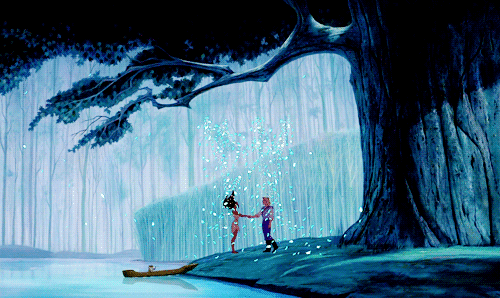 |
| It is a pretty movie, though. |

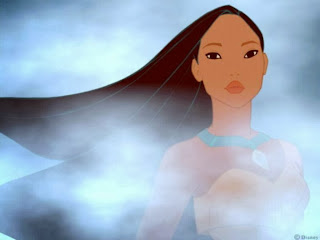
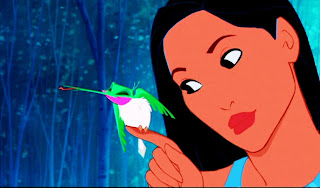
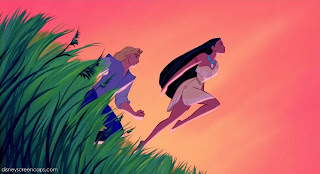

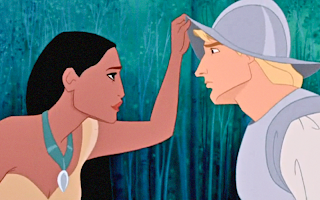

You know, I agree with nearly all of this. As a kid this was my favorite Disney movie, so I'm a bit biased, but not to the point that I can't take several steps back and appreciate the myriad faults in it.
ReplyDeleteI guess the only thing I want to point out is that there WAS fighting and war among the Native Americans in this movie. The whole reason Pocahontas' father has to return at the beginning of the movie is that he was at war with a different tribe. It's very vague and not well explained, but that point is that there was fighting.
Of course, the wise man character has his whole spiel about how the white men bring killing and death. But it's not like those things didn't exist before hand--it's more that they'll bring more of it, and directed specifically at all of the Native Americans, not just the warriors.
So, while I agree with virtually everything you pointed out, the basis for one of your biggest arguments is not very solid based on the context of what's explained in the movie.
I get why most people online don't like Pocahontas but I've always loved it/her (and I'm part Native American as well as my stepdad being half Native American).
ReplyDeleteI love that like the other Disney heroines, she doesn't settle with whatever man society or her father wants. She is all about two things, being true to her thirst for adventure and true to her heart. I think that "colors of the wind" is the best anti-xenophobia song I've ever heard and ties in nicely with the pro-xenophobia song sung by Gaston in Beauty & the Beast. I love that Pocahontas jumped off and canoed down waterfalls without fear and explored her surroundings and stood up for what she believed was right.
I didn't buy the romance either but she didn't end up marrying him and they part ways in the sequel when it's clear he still doesn't get where she's coming from. I think that pushing the romance angle is a problem with most movies whenever they have a heterosexual man & woman or two homosexual characters you know they almost always end up in a romance instead of a friendship. On some shows as soon as two characters that were only regular friends start becoming good friends I groan because I know by within the next couple of episodes they'll be in bed together.
I understood why Pocahontas would be drawn to him though. Not so much him but the situation of him. She believed in signs from the universe and then along comes this foreigner (who came from just around the river bend beyond the shore, just like she was singing prior to meeting him) that she can converse with despite speaking different languages and she felt like it was a fate encounter.
Thanks for a marvelous posting! I actually enjoyed reading it, you might be
ReplyDeletea great author.I will be sure to bookmark your blog and will
often come back at some point. I want to encourage yourself to continue your great posts,
have a nice day!
my web page; 휴게텔
(freaky)